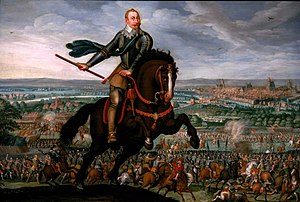
Back التدخل السويدي في حرب الثلاثين عاما Arabic Шведски период на Тридесетгодишната война Bulgarian Intervensi Swedia di Perang Tiga Puluh Tahun ID Guerra dei trent'anni (fase svedese) Italian د دېرشو کلونو په جګړه کې د سويډن مداخله Pashto/Pushto Шведская интервенция в Германию в ходе Тридцатилетней войны Russian
| Swedish Intervention | |||||||
|---|---|---|---|---|---|---|---|
| Part of the Thirty Years' War | |||||||
 Gustavus Adolphus at the Battle of Breitenfeld | |||||||
| |||||||
| Belligerents | |||||||
|
|
| ||||||
| Commanders and leaders | |||||||
|
|
| ||||||
| Strength | |||||||
|
1630: 70,600 24,600 men garrisoning Sweden |
1632: 110,000 pro-Imperial troops in Germany[4] | ||||||
| Casualties and losses | |||||||
| 86,300 killed, captured and deserted | 80,760 killed, captured and deserted | ||||||
The Swedish invasion of the Holy Roman Empire or the Swedish Intervention in the Thirty Years' War is a historically accepted division of the Thirty Years' War. It was a military conflict that took place between 1630 and 1635, during the course of the Thirty Years' War. It was a major turning point of the war: the Protestant cause, previously on the verge of defeat, won several major victories and changed the direction of the War. The Habsburg-Catholic coalition, previously in the ascendant, was significantly weakened as a result of the gains the Protestant cause made. It is sometimes considered to be an independent conflict by historians.
Following the Edict of Restitution by Emperor Ferdinand II on the height of his and the Catholic League's military success in 1629, Protestantism in the Holy Roman Empire was seriously threatened. In July 1630, King Gustav II Adolf of Sweden landed in the Duchy of Pomerania to intervene in favor of the German Protestants. Although he was killed in battle at Lützen, southwest of Leipzig, the Swedish armies achieved several victories against their Catholic enemies. However, the decisive defeat at Nördlingen in 1634 threatened continuing Swedish participation in the war. In consequence, the Emperor made peace with most of his German opponents in the Peace of Prague – essentially revoking the Edict of Restitution – while France directly intervened against him to prevent the Habsburg dynasty from gaining too much power at its eastern border.
Sweden was able to fight on until the Peace of Westphalia in 1648 in which the Emperor was forced to accept the "German liberties" of the Imperial Estates and Sweden obtained Western Pomerania as an Imperial Estate.
Cite error: There are <ref group=lower-alpha> tags or {{efn}} templates on this page, but the references will not show without a {{reflist|group=lower-alpha}} template or {{notelist}} template (see the help page).
- ^ a b c Schmidt & Richefort 2006, p. 49.
- ^ Oakley 1992, p. 69.
- ^ Clodfelter, M. (2008). "Warfare and Armed Conflicts: A Statistical Encyclopedia of Casualty and Other Figures, 1492–2015 (2017 ed.)." McFarland. Pages 39–40.
- ^ Clodfelter, p. 40. States that both sides had a combined 250,000 troops in the area in 1632 and that 140,000 of these were on the side of the King of Sweden. The Spanish Empire, allied with the Habsburgs, had over 200,000 troops, but almost none of these were deployed against the Swedish, the bulk being stationed in either the Iberian peninsula and Italy to guard against insurrections and French incursions, or in the Army of Flanders facing the Dutch.